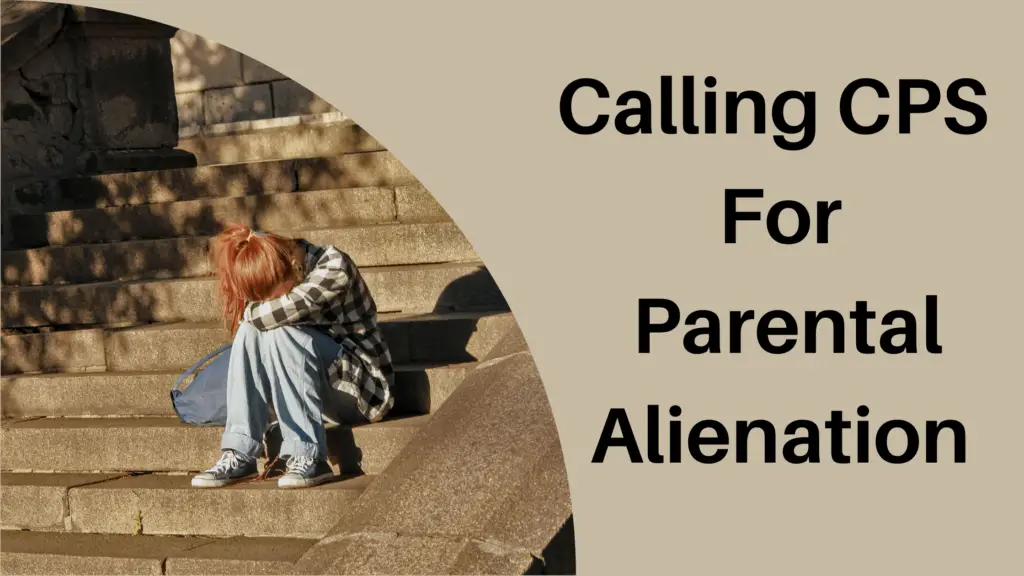Parental alienation is a heart-wrenching issue that can cause profound emotional and psychological harm to children. In the family set up, it has become a new norm. The question that befuddles is: can I call cps for parental alienation.
What is Parental Alienation?
Parental alienation is a deeply troubling phenomenon wherein one parent employs manipulation or coercion to induce a child to create emotional and psychological distance from the other parent. This often encompasses making negative remarks, leveling false accusations, and endeavoring to restrict or entirely sever communication and interaction between the child and the parent being targeted. These actions can ultimately mold the child’s perception of the targeted parent in a distorted and skewed manner, frequently culminating in strained relationships and intense emotional upheaval.
Understanding the Role of Child Protective Services (CPS)
Child Protective Services (CPS) operates as a governmental entity with the pivotal responsibility of guaranteeing the safety, welfare, and shielding of children against abuse, negligence, and diverse maltreatment forms. It is important to recognize that while parental alienation is an undoubtedly significant concern, CPS’s central focus is directed towards cases that prominently display explicit and immediate threats to a child’s physical, emotional, or mental well-being.
During the evaluation of parental alienation cases, CPS meticulously takes into account an array of factors that facilitate the determination of whether intervention is warranted. These considerations encompass the gravity of the alienation being perpetuated, the child’s current emotional disposition, the potential for long-term harm, and the overarching impact on the child’s overall welfare.
Can I Call CPS for Parental Alienation
Now back to our question “can I call cps for parental alienation?” The answer is as simple yes, you can call CPS for parental alienation. CPS is a form of emotional abuse that can have a serious impact on a child’s well-being. So, if you believe that your child is being alienated from you by the other parent, you should contact CPS.
However, prior to reaching out to CPS, it’s vital to recognize that CPS might not always represent the most optimal approach for addressing parental alienation. Their capabilities to effectively halt the alienation could be limited, and in certain instances, involving them might inadvertently exacerbate the situation. Exploring alternative avenues could prove more constructive. Consulting a family law attorney or enlisting the expertise of a therapist specializing in parental alienation might offer more targeted assistance in navigating this complex issue.
Before making the decision to call CPS for parental alienation, here are some things you should ask yourself first:
- The severity of the alienation. If the alienation is mild, it may not be worth involving CPS. However, if the alienation is severe and is causing your child significant emotional distress, then CPS may be able to help.
- The evidence of alienation. You will need to provide CPS with evidence that the other parent is intentionally alienating your child from you. This evidence could include text messages, emails, social media posts, or testimony from witnesses.
- The likelihood of success. It is important to be realistic about the chances of CPS being able to stop the alienation. In some cases, CPS may be able to mediate between the parents and help them to come to an agreement. However, in other cases, the alienation may be so severe that CPS will not be able to do anything.

How Do CPS Investigate Parental Alienation?
CPS initiates an investigation by gathering information from multiple sources. This involves conducting interviews with both parents, caregivers, and the child. The aim is to gather a holistic view of the family dynamics and the extent of the alienation.
CPS collaborates also with mental health professionals and legal experts to ensure a thorough assessment. These experts contribute their specialized insights to determine the psychological and emotional impact of the alienation on the child.
What to Do If You Are a Victim of Parental Alienation
If you find yourself victimized by parental alienation, it’s essential to understand your legal rights. Consult with an attorney who specializes in family law to gain clarity on the available legal remedies.
Document every instance of parental alienation that you witness or experience. Maintain a detailed record that includes dates, times, locations, statements made, and any relevant context. This documentation could prove invaluable if legal action becomes necessary.
Exploring avenues of mediation and therapy can facilitate open lines of communication between parents and contribute to the child’s emotional healing. Mediators and therapists can provide a neutral ground where grievances can be addressed constructively.
How Do You Prove Narcissistic Parental Alienation?
Narcissistic parental alienation often involves manipulative behaviors driven by a parent’s excessive need for control and dominance. Such parents may prioritize their own desires over the child’s well-being.
To prove narcissistic parental alienation, you need evidence. Gathering evidence of narcissistic parental alienation requires careful documentation of actions and statements. Keep a detailed record of instances where the alienating parent attempts to distort reality, control information, or manipulate the child’s emotions.
Seeking the involvement of mental health professionals can be crucial in substantiating claims of narcissistic parental alienation. These experts can assess the psychological impact on the child and provide insights into the manipulative behaviors at play.
Read About: How to Combat Parental Alienation in Teenagers
Can a Child Recover from Parental Alienation?
Yes, children can recover from parental alienation. Early intervention significantly increases the likelihood of a child’s recovery from parental alienation. Addressing the issue promptly can prevent deep-seated emotional scars from forming.
The best approach to aiding a child in overcoming parental alienation involves seeking guidance from a specialized therapist. Engaging in therapy and counseling is of paramount importance as it plays a central role in facilitating a child’s recovery from the adverse effects of parental alienation. Seasoned therapists create a secure and nurturing space where the child can freely communicate their emotions and systematically navigate through the complex emotional challenges.
While recovery is possible, it’s important to recognize that the long-term effects of parental alienation on a child’s psychological well-being can be substantial. Some children may require ongoing therapy and support to fully heal.
Potential Outcomes of CPS Involvement
If you involve CPS, expect then to carry out an investigation. They initiate an investigation into parental alienation by examining the child’s living conditions and conducting interviews with the involved parties. They aim to ascertain the degree of emotional and psychological harm suffered by the child.
In cases where parental alienation is identified but does not warrant immediate removal from the home, CPS may offer supportive services. These services may include family counseling, parenting education, and therapy for the child.
In situations where parental alienation poses a severe threat to the child’s well-being, CPS may initiate legal proceedings. This could involve seeking court orders to ensure the child’s safety and promote a healthy relationship with both parents.
Legal and Ethical Considerations
Striking a balance between parental rights and child protection is a nuanced task. CPS is responsible for safeguarding children while respecting parents’ rights to raise their children as they see fit, within the boundaries of safety.
While it’s crucial to address parental alienation, making false or exaggerated reports to CPS can have legal consequences. Ensure that your concerns are well-founded and substantiated before taking this step.
Conclusion
Tackling parental alienation is a profoundly emotional journey that requires careful consideration of various factors. While the question of involving CPS in cases of parental alienation is can be challenging, understanding the role of CPS, recognizing signs of alienation, and anticipating potential intervention outcomes empower you to make informed decisions. Keep in mind that involving legal professionals and collaborating with mental health experts are pivotal steps in addressing parental alienation effectively.







